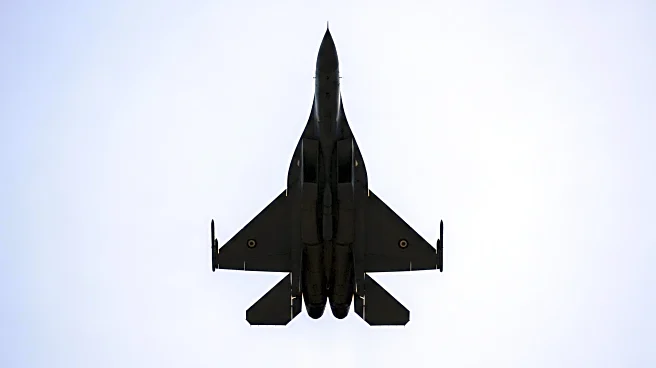What is the story about?
What's Happening?
Italy is preparing to utilize an EU-devised accounting mechanism to increase its defense budget by €12 billion, equivalent to $14 billion, in an effort to meet NATO's stringent spending targets. This plan, developed in Brussels, allows EU member states to exclude defense spending from their annual deficit calculations, enabling them to raise defense budgets without breaching EU deficit rules. Italy's readiness to employ this rule was indicated in a Ministry of Finance budget document, which stated that the National Escape Clause (NEC) could be activated if low-cost EU loans under the SAFE program are insufficient to meet NATO's requirement for members to allocate 5% of GDP to defense and security by 2035. Italy has already applied for €14.9 billion in SAFE loans and plans to provide the EU with a list of defense products for expenditure by November 30.
Why It's Important?
The move to increase defense spending is significant as it reflects Italy's commitment to enhancing its military capabilities in response to NATO's demands, particularly in light of Russia's invasion of Ukraine. This decision could have broader implications for Italy's fiscal policy and its relationship with the EU, as it navigates the balance between meeting defense obligations and adhering to fiscal sustainability. The use of the NEC provides Italy with budgetary flexibility, allowing it to increase defense expenditure without triggering penalties associated with breaching EU budgetary limits. This could set a precedent for other EU member states facing similar challenges in meeting NATO's defense spending targets.
What's Next?
Italy's decision on whether to activate the NEC will be made after assessing the effectiveness of the SAFE program. The European Commission is expected to respond to Italy's request for defense spending by December 31. Italy aims to gradually increase its defense budget to 2.5% of GDP by 2028, with careful planning to avoid market price hikes due to rapid budget increases. The government is also considering reclassifying parts of the Italian coast guard as military units to meet spending targets, although no formal announcement has been made yet.
Beyond the Headlines
The strategic use of the NEC highlights the EU's willingness to adapt fiscal rules to accommodate increased defense spending among member states. This flexibility is crucial in ensuring that rising defense expenditure does not compromise fiscal sustainability. Italy's approach may influence other EU countries to adopt similar strategies, potentially leading to a shift in how defense budgets are managed across the continent.















